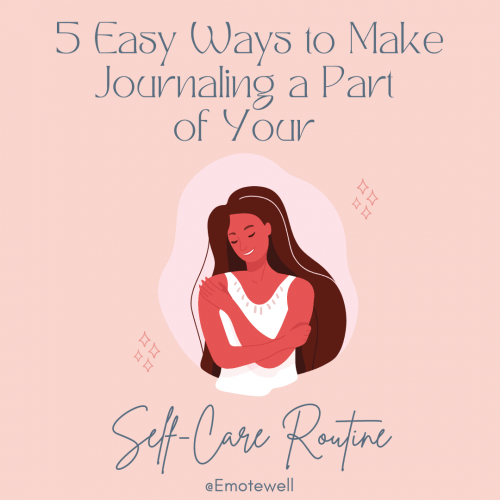
The Power of Journaling
You’ve likely heard about meditation as a way to reduce stress, anxiety, and improve mental well-being. But did you know that journaling, a key intervention used in psychology research, produces similar results? Not only can journaling serve as a safe space to process your thoughts and emotions, but it can also help you understand yourself and your emotions on a deeper level. Not only that, research has also shown that journaling can lead to an improved immune system, better sleep, and better quality of life.
Too Much of a Hassle?
Journaling may seem like a time-consuming task at first. In an age where time is limited and there’s an infinite amount of tasks to complete, whether it be work or personal life, one of the biggest roadblocks of journaling is not knowing how to implement it into your day-to-day life. At times you may feel so busy and overwhelmed that you have virtually no leisure time, let alone time to journal, but integrating it into your self-care routine is much easier than you might think.
How Journaling Can Lead to a More Fulfilling Daily Routine
Journaling doesn’t mean giving up time better spent elsewhere. In fact, journaling can help you become more productive by helping you gain clarity, become more focused, and relieve stress. Instead of scrolling through your phone or anxiously checking your never-ending emails, try logging onto a digital journal. Taking merely 5-15 minutes to express your thoughts and emotions can give you a mental health boost and set you on a positive note for the rest of your day. Over time, it can build up into a consistent and integral part of your self-care routine that can make your day feel more fulfilling.
Here are 5 journaling exercises to easily integrate into your self-care routine:
1. Gratitude Journal
Research has shown that giving thanks to the positive aspects of our lives can create a positive effect on our mental well-being, health, and relationships. Writing about gratitude allows us to be more aware of the plethora of positive things around us each day, helping us recognize the emotional impact of what we may have previously taken for granted. Spend 10 minutes jotting down things you’re grateful for in detail, and you’ll find yourself reaping the benefits of happiness and better health.
2. Self Distancing from Negativity
If you’ve ever found yourself spiraling down from negativity, you’re aware how this can be counterproductive by exacerbating pain. By reflecting on negative emotions from a detached, third-person perspective, you can better engage in adaptive self-reflection, which can help alter the way you see a situation by gaining closure and better insight. This is a short yet impactful 5-minute exercise you can practice whenever you find yourself overthinking about a negative experience.
3. Expressive Writing
You may have heard of stream of consciousness before. Expressive writing follows a similar format in that you can write freely about emotional challenges or stressful events without regarding form or writing conventions. Through this 15-minute exercise, you are able to gain agency over your life by taking painful or stressful experiences and form a narrative to help you gain a sense of control. Research has shown that this method can lower symptoms of depression, improve both mood and sleep, and improve your relationships.
4. Gain Perspective on Conflicts
Conflicts can arise from any relationship, and thankfully, journaling can bring you one step closer to resolving these conflicts. By reflecting on conflicts through a third-person perspective, you can better handle your emotions and discover the root of the issue. Research has shown that this method can preserve relationship satisfaction by improving trust, love, and passion.
5. Self Compassionate Letter
Often, we are our own worst critics. This in turn creates more anxiety, life dissatisfaction, or depression. Psychologist Kristen Neff categorizes self-compassion into 3 parts: self-kindness, the human experience, and mindfulness. Research has shown that self-compassion can lower symptoms of anxiety or depression, improve well-being, and improve emotional coping strategies. This exercise can help you accept your flaws and humanness, prevent yourself from engaging in guilt or self-blame, and grow from challenges or struggles. Write a self-compassionate letter to yourself about a topic you feel insecure or frustrated about, and it’ll help reduce stress and improve your well-being.
What Are You Waiting For? Start Now
These 5 journaling exercises are just some of many ways journaling can improve your mental and physical well-being. Each of these effective journaling exercises, plus many more, is offered at EmoteWell, a digital journal that provides exercises backed by psychology research. EmoteWell can help you track your journaling progress, build consistency, and effectively integrate journaling into your self-care routine. To join the beta version of EmoteWell, use the code joinbeta at www.emotewell.com to gain 30 days of free access to these exercises and become a happier and healthier you.
